Hdd Fix
Posted: January 3, 2011
Threat Metric
The following fields listed on the Threat Meter containing a specific value, are explained in detail below:
Threat Level: The threat level scale goes from 1 to 10 where 10 is the highest level of severity and 1 is the lowest level of severity. Each specific level is relative to the threat's consistent assessed behaviors collected from SpyHunter's risk assessment model.
Detection Count: The collective number of confirmed and suspected cases of a particular malware threat. The detection count is calculated from infected PCs retrieved from diagnostic and scan log reports generated by SpyHunter.
Volume Count: Similar to the detection count, the Volume Count is specifically based on the number of confirmed and suspected threats infecting systems on a daily basis. High volume counts usually represent a popular threat but may or may not have infected a large number of systems. High detection count threats could lay dormant and have a low volume count. Criteria for Volume Count is relative to a daily detection count.
Trend Path: The Trend Path, utilizing an up arrow, down arrow or equal symbol, represents the level of recent movement of a particular threat. Up arrows represent an increase, down arrows represent a decline and the equal symbol represent no change to a threat's recent movement.
% Impact (Last 7 Days): This demonstrates a 7-day period change in the frequency of a malware threat infecting PCs. The percentage impact correlates directly to the current Trend Path to determine a rise or decline in the percentage.
| Threat Level: | 10/10 |
|---|---|
| Infected PCs: | 194 |
| First Seen: | January 3, 2011 |
|---|---|
| Last Seen: | May 6, 2024 |
| OS(es) Affected: | Windows |
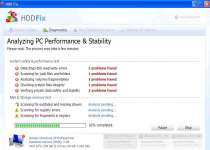 Hdd Fix (HddFix) is an illegitimate disk defragmentation application. Hdd Fix is used to trick unsuspecting users into purchasing it as a supposed remedy to falsely detected system errors. Hdd Fix is spread by Trojans; once the Trojans have installed and executed Hdd Fix on a system it will display fake scanners and pop-up alerts claiming to detect several errors in the hard drive, CPU as well as the system memory.
Hdd Fix (HddFix) is an illegitimate disk defragmentation application. Hdd Fix is used to trick unsuspecting users into purchasing it as a supposed remedy to falsely detected system errors. Hdd Fix is spread by Trojans; once the Trojans have installed and executed Hdd Fix on a system it will display fake scanners and pop-up alerts claiming to detect several errors in the hard drive, CPU as well as the system memory.
When a victim attempts to launch other programs on a compromised system, Hdd Fix may end the processes in order to further alarm the victim. The errors detected by Hdd Fix are not to be trusted and are better ignored. Hdd Fix can be removed with a good and legitimate anti-rogueware application.
Aliases
More aliases (29)
Use SpyHunter to Detect and Remove PC Threats
If you are concerned that malware or PC threats similar to Hdd Fix may have infected your computer, we recommend you start an in-depth system scan with SpyHunter. SpyHunter is an advanced malware protection and remediation application that offers subscribers a comprehensive method for protecting PCs from malware, in addition to providing one-on-one technical support service.
* See Free Trial offer below. EULA and Privacy/Cookie Policy.
Why can't I open any program including SpyHunter? You may have a malware file running in memory that kills any programs that you try to launch on your PC. Tip: Download SpyHunter from a clean computer, copy it to a USB thumb drive, DVD or CD, then install it on the infected PC and run SpyHunter's malware scanner.
Technical Details
File System Modifications
Tutorials: If you wish to learn how to remove malware components manually, you can read the tutorials on how to find malware, kill unwanted processes, remove malicious DLLs and delete other harmful files. Always be sure to back up your PC before making any changes.
The following files were created in the system:%TEMP%\XCiJPtLinj.exe
File name: XCiJPtLinj.exeSize: 447.48 KB (447488 bytes)
MD5: 97a5ab3750d0ae23186938ba84595d9a
Detection count: 141
File type: Executable File
Mime Type: unknown/exe
Path: %TEMP%
Group: Malware file
Last Updated: January 3, 2011
%WinDir%\system32\drivers\sst3.sys
File name: sst3.sysSize: 53.24 KB (53248 bytes)
MD5: A910550EDFB87A7EE5A5EBEC7CB35E54
Detection count: 56
File type: System file
Mime Type: unknown/sys
Path: %WinDir%\system32\drivers
Group: Malware file
Last Updated: January 3, 2011
%WinDir%\system32\spool\prtprocs\w32x86\1362.tmp
File name: 1362.tmpSize: 118.78 KB (118784 bytes)
MD5: 695d2d58b32218f8f5aed3d936128b8b
Detection count: 43
File type: Temporary File
Mime Type: unknown/tmp
Path: %WinDir%\system32\spool\prtprocs\w32x86
Group: Malware file
Last Updated: January 3, 2011
%Temp%\1363E8.tmp
File name: 1363E8.tmpSize: 266.81 KB (266816 bytes)
MD5: 6975e274e19c98d18dd17bc14b7a263c
Detection count: 41
File type: Temporary File
Mime Type: unknown/tmp
Path: %Temp%
Group: Malware file
Last Updated: January 3, 2011
%ALLUSERSPROFILE%\Application Data\pjxNFKyOlXuOQcc.dll
File name: pjxNFKyOlXuOQcc.dllSize: 417.28 KB (417280 bytes)
MD5: 75982dcd655c0355744417403fed12b9
Detection count: 40
File type: Dynamic link library
Mime Type: unknown/dll
Path: %ALLUSERSPROFILE%\Application Data
Group: Malware file
Last Updated: January 3, 2011
%ALLUSERSPROFILE%\Application Data\sA60Bt6jY3Rq.exe
File name: sA60Bt6jY3Rq.exeSize: 381.44 KB (381440 bytes)
MD5: E358517CE575A8ED2D8C9A538B6E525D
Detection count: 13
File type: Executable File
Mime Type: unknown/exe
Path: %ALLUSERSPROFILE%\Application Data
Group: Malware file
Last Updated: January 3, 2011
C:\rogues\w32 fakesysdef\9814be8d02b3033ca69ff6895a329df1abc5c4014c94a0eef137a976a15354b6
File name: 9814be8d02b3033ca69ff6895a329df1abc5c4014c94a0eef137a976a15354b6Size: 465.4 KB (465408 bytes)
MD5: e55df9c52a7624e90a0d29b9c0bf7049
Detection count: 12
Path: C:\rogues\w32 fakesysdef\9814be8d02b3033ca69ff6895a329df1abc5c4014c94a0eef137a976a15354b6
Group: Malware file
Last Updated: May 6, 2024
More files
Additional Information
| # | Message |
|---|---|
| 1 | "Windows detected a hard drive problem.
A hard drive error occurred while starting the application." "Critical Error Hard Drive not found. Missing hard drive." |
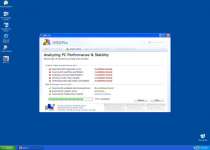
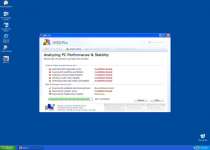
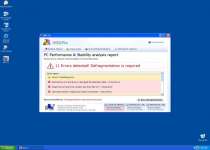
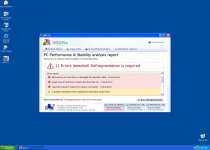
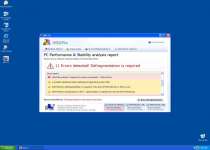
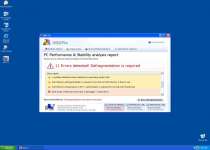
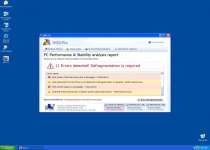
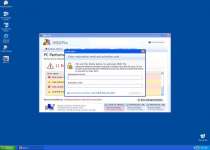
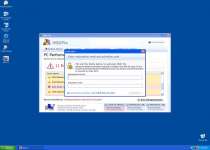
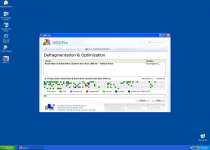
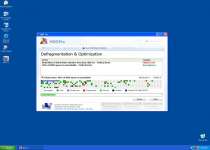
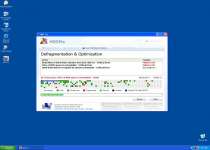
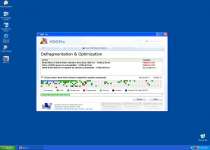
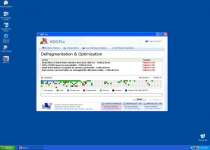
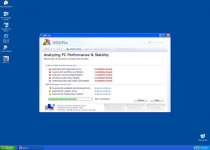
Leave a Reply
Please note that we are not able to assist with billing and support issues regarding SpyHunter or other products. If you're having issues with SpyHunter, please get in touch with SpyHunter customer support through your SpyHunter . If you have SpyHunter billing questions, we recommend you check the Billing FAQ. For general suggestions or feedback, contact us.